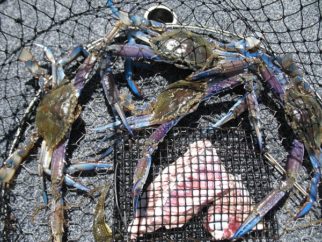A lengthy winter and lower than average water temperature is predicted to cause a slow start to Crabbing this season. The iconic Mandurah crab fishery opened on November 1st, however fishers are not expected to encounter good numbers of legal sized crabs for at least another month.
It is important to recognise that many crabs will still currently be undersize, and that your crabbing efforts may be better spent later in the season. Crabs grow rapidly as water temperatures warm up in late December and January and this is considered the best time to fish for crabs. Whenever you go crabbing remember to always carry a crab gauge and measure the crabs correctly from point to point on the carapace (body) to ensure they are larger than the minimum legal size of 127mm.
Be sure to abide by the personal bag limit of 10 and boat limit of 20 crabs, and a maximum of 10 pots is allowed per person/boat. A Recreational Boat Fishing Licence is required if taking or transporting crabs by boat.
New rules regarding the immediate release of protected crabs are now in effect, meaning that undersize and berried (egg-carrying) crabs must be released as soon as they are caught before resuming fishing. It is also important to know that uncooked crabs MUST be maintained whole and not dissected or altered in any form prior to preparation for consumption.
Lastly, it is always important to be mindful in your fishing activities and respect the environment in which you are accessing. The surrounding environment adjacent to crab habitat is also important for a host of other fish, invertebrate and bird species and there are many environmental groups actively working at restoring much of the riparian vegetation and coastal plants that help to maintain the health and function of our estuaries.
Groups like the Peel Harvey Catchment Council are actively involved in some of these efforts and we urge fishers to think before you step, and use designated access points to your fishing grounds in order to preserve the delicate plants that are invaluable to improving the fishing environment.
 The Peel-Harvey blue swimmer crab fishery is the most popular WA recreational fishery and also provides a livelihood for 10 commercial crab licence holders. Receiving this world-first certification ensures the longevity of this fishery and Recfishwest has been an enthusiastic supporter of the process, which protects and promotes sustainable and enjoyable fishing opportunities for the WA community.
The Peel-Harvey blue swimmer crab fishery is the most popular WA recreational fishery and also provides a livelihood for 10 commercial crab licence holders. Receiving this world-first certification ensures the longevity of this fishery and Recfishwest has been an enthusiastic supporter of the process, which protects and promotes sustainable and enjoyable fishing opportunities for the WA community.
